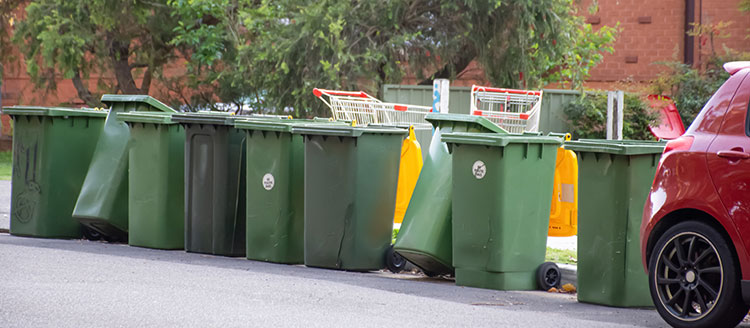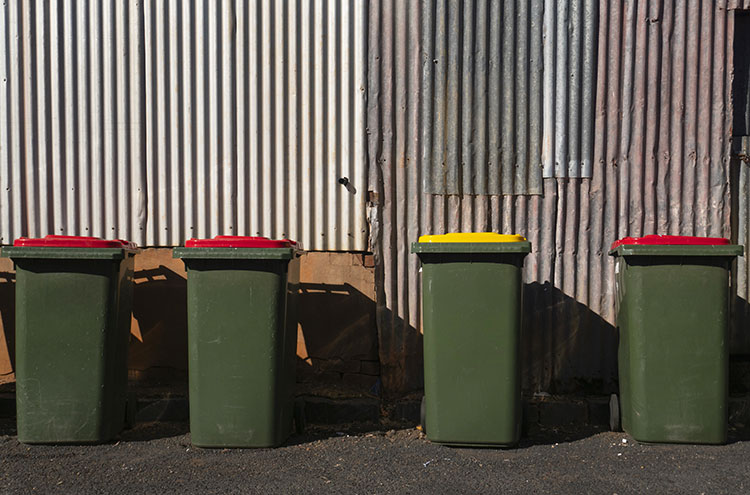
Updated 21 January 2025
Proper waste disposal is one of the key ingredients of a progressive nation. Unfortunately, there are still many residents in Australia with damaged and awful-smelling bins. In 2015, it was announced that homeowners could get fined for the following offences:
In some parts of Western Australia, local councils do issue fines for misuse or poor maintenance of council bins. The rules and amounts can differ greatly depending on where you live. Certain councils list offences such as:
- Failing to keep bins clean or secure from pests (often around $250)
- Putting the wrong items in recycling or general waste bins (around $350)
- Damaging or mishandling council-owned bins (around $400)
Councils may start with a warning or lower on-the-spot fines. But if a case goes to court (which is rare), you could face larger penalties. Always check with your local council to find out their specific by-laws and requirements. You can usually find this information on the council’s website or by giving them a call.
The $5,000-Smelly Bin Penalty
Rumours about the outrageous $5,000 penalty had many people up in arms. And no, we’re not talking about the littering penalties for individuals. The said amount was alleged to be enforced on homeowners whose rubbish bins were smelly and contaminated. For a while, this “news” circulated and was thought to be a part of the Perth Council of Victoria Park’s new program. That is until Mayor Karen Vernon clarified the issue relating to the hefty charge.
According to Cr Vernon, the $5,000 fine can help the council in changing the behaviour of some residents who do not follow the bin regulations. However, this whopping amount will not be immediately imposed. Rather, there will be an investigation. If it becomes a court case, the maximum penalty is indeed $5,000. Nevertheless, the council does not believe that homeowners will face such a charge.
As a responsible citizen, it is necessary to be in line with the goals of the local government. Taking simple steps to clean and maintain your bin can significantly contribute to these initiatives.
The local councils make it easy for the residents to get rid of their waste through scheduled bin collections. General rubbish is typically collected each week while those in the recycling bin are gathered every two weeks. All collections take place per schedule except on Christmas Day, New Year’s Day, and Good Friday.
Most types of general rubbish are supported except for the following:
- Hot ashes
- Bricks
- Building materials
- Tiles
- Concrete
- Asbestos
- Hazardous waste, such as motor oil, petrol, paints, and flammables
- Tyres and other car parts
The items that you can and cannot put in the bins that your city issued will depend on the regulations of the city itself. However, they mostly comprise the mentioned waste above.
As for recycling bins, you can place the following:
- Aluminium cans
- Cardboard boxes
- Paper
- Glass
- Plastic bottles without lids
- Steel cans
Remember: Never put plastic bags in the bins.
Aside from the contents of the bins, you should also determine where to properly place them:
- The bins should be on the verge, with the wheels facing your property. Make sure it is not more than one metre away from the kerb. It will help the collectors find the bins easily.
- Take note of the collection schedule. Typically, residents are required to place the bins at the specified location on their property by 6 AM.
- For recycle bins, they should be about half a metre away from the rubbish bin. This way, the collection truck’s arm can quickly collect the bins one after the other without a hitch.
- Bins should not be placed behind cars or immediately next to garage doors. They should not be under a tree canopy as well.
Note that the bins come in either a dark green or red lid, which is the general rubbish bin while the one with the yellow lid is the recycling bin. However, the general waste bins with dark green lids may soon be replaced with red in compliance with the Australian Standard 4123.7-2008 for Mobile Waste Containers – Colours, Markings, and Designation Requirements.
Meanwhile, the Waste Avoidance and Resource Recovery Act 2008 is an act that provides waste services by the local governments in Western Australia and other regions in the country. It also sets the guidelines for container depositing and levies on waste.
The Bin Systems in Western Australia
WA has two and three-bin systems. The two-bin system comprises the recycling and rubbish or general waste bins, as discussed above. You can have two or three bins depending on the size of your property.
Typically, properties that are below 400m2 have two bins, as well as those living in apartments and other multi-residential properties. Rural homes are also a part of the two-bin system in WA.
The government issues three bins to residents that require a waste bin for their garden waste, which can be converted to mulch. In some cities, the three-bin system has already been rolled out to all residential properties that are over 400m2. However, rural, commercial, apartment, and industrial properties are not included in the rollout.
The three-bin system comprises the following:
- Yellow bin lid: Measures 240 litres and is used for recycling
- Lime or green lid: Measuring 240 litres and used for garden organics
- Red lid bins: Measure 140 litres and are for collecting general waste
If you still have the dark green lid, it will soon be replaced with the right colour and the existing lid will be recycled.
What You Need to Know about the FOGO Three-Bin System
Only a fraction of Australian households have a third bin, but it will soon make its way to your home. The aim is to solve a significant waste issue in the country involving organics. Dubbed FOGO, which stands for Food Organics Garden Organics, it is an addition to an already-effective two-bin system (red and yellow).
If you have been using the green bin for some time, things are about to get a little bit confusing as the rules have changed. Depending on where you live, the green bin may be reserved only for garden organics. In other areas, you can place food organics for composting.
FOGO or the green-topped council bins aim to reduce $3,500 worth of food that the average Australian family disposes of each year. This bin was supposed to be distributed to households by 2023 but the rollouts have been delayed. However, it is expected to help divert several tonnes of food and organic waste from going to landfills.
The Waste and Recycling Bin Guide for Perth Residents
Although this guide is for those in Perth, residents of other places, especially those in nearby areas can use it.
With millions of tonnes of waste produced every year, citizens are encouraged to do their part in taking care of their waste disposal. Residents and commercial business owners simply have to put their unwanted things in the bin. The council will then take them away. It sounds straightforward and it is!
Once the waste is out of your property, you forget about it.
However, the amount only gets bigger every year and it may become a problem in the coming years. Landfills are getting more rubbish than they can soon handle. It is why programs like the Waste Avoidance and Resource Recovery Strategy 2030 were introduced to improve recycling, reusing, and managing waste. The goals of this specific initiative include reaching 20% less waste per capita whilst increasing material recovery to 75% by 2030. Not only that, about 9.2 full-time jobs are created for every 10,000 tonnes of waste recycled.
This guide is to help residents, visitors, and businesses in the city and even the whole state to reduce waste production:
- You can select the items that do not create waste over those that you normally use. The best approach is to avoid producing waste in the first place. Planning and making conscious decisions on the items you buy can lower the amount of waste produced.
- Waste reduction is achievable when you only purchase the things you need. This method also aids in reducing clutter, especially if you buy smaller quantities of items.
- Reusing items you no longer need can certainly lower the waste produced all over the city.
- Some items can be repurposed or repaired instead of throwing them in the bin. Check them first before deciding to completely let them go.
- Raw materials can be obtained from the item that you may have recycled, allowing you to create new products out of them. Some waste can also be transformed into energy.
Remember that everything that you did not recycle, reuse, recover, or repurpose will go directly to a landfill, or worse in the environment.

Other Helpful Tips for Bin Use
To lower the amount of waste that you, your family, or your business produces, the following ideas can help:
- Plan your shopping and opt for reusable products whenever necessary. Some examples of reusable items are Bring-Your-Own cups and bottles and shopping bags. For your electronics that require batteries, you should choose rechargeable ones over those that you can throw away after use. Always choose reusable straws over plastics, which is a movement that can also help the planet.
- Join groups with a purpose targeted at reducing waste. Facebook and other social media platforms allow citizens of Perth and the whole country to unite against the overproduction of waste. You can join these small online communities like Buy Nothing where people work together to create items from their waste materials and other things they no longer need. Instead of throwing these items away, they give them away to other people who may have a use for them. You can participate in the exchange where you can give or receive. It helps reduce waste, save you money, and even boost community togetherness. Plus, you get free items, although you should only take what you need.
- Take care of the bins. Follow all the rules and guidelines in using the bins, especially the items that you can and cannot place in them. Ensure that you always close the lid to keep pests away from your home. It will also help minimise smells. If you have a kitchen bin, you need to keep it clean as well. For wheelie bins that the council owns, you may not think about cleaning them since they are outside your home anyway. However, they can become a breeding ground for pests and disease-causing bacteria. You can use rubbish bags to avoid attracting insects. Store your bins properly, making sure they do not emit strong odours. You can also squirt some citrus juice on the lid and handle.
The City of Perth offers a downloadable guide for the best recycling and waste disposal practices for 2024-25.
Hire a Skip Bin for Your Property
Although you already have wheelie bins, hiring a skip bin can be beneficial for you. If you have construction projects, for instance, you can hire a skip bin from Backyard Bins to help get rid of construction waste and garden waste that are not allowed in regular bins.
Backyard Bins Team
“ [rcblock id="2165"]”
